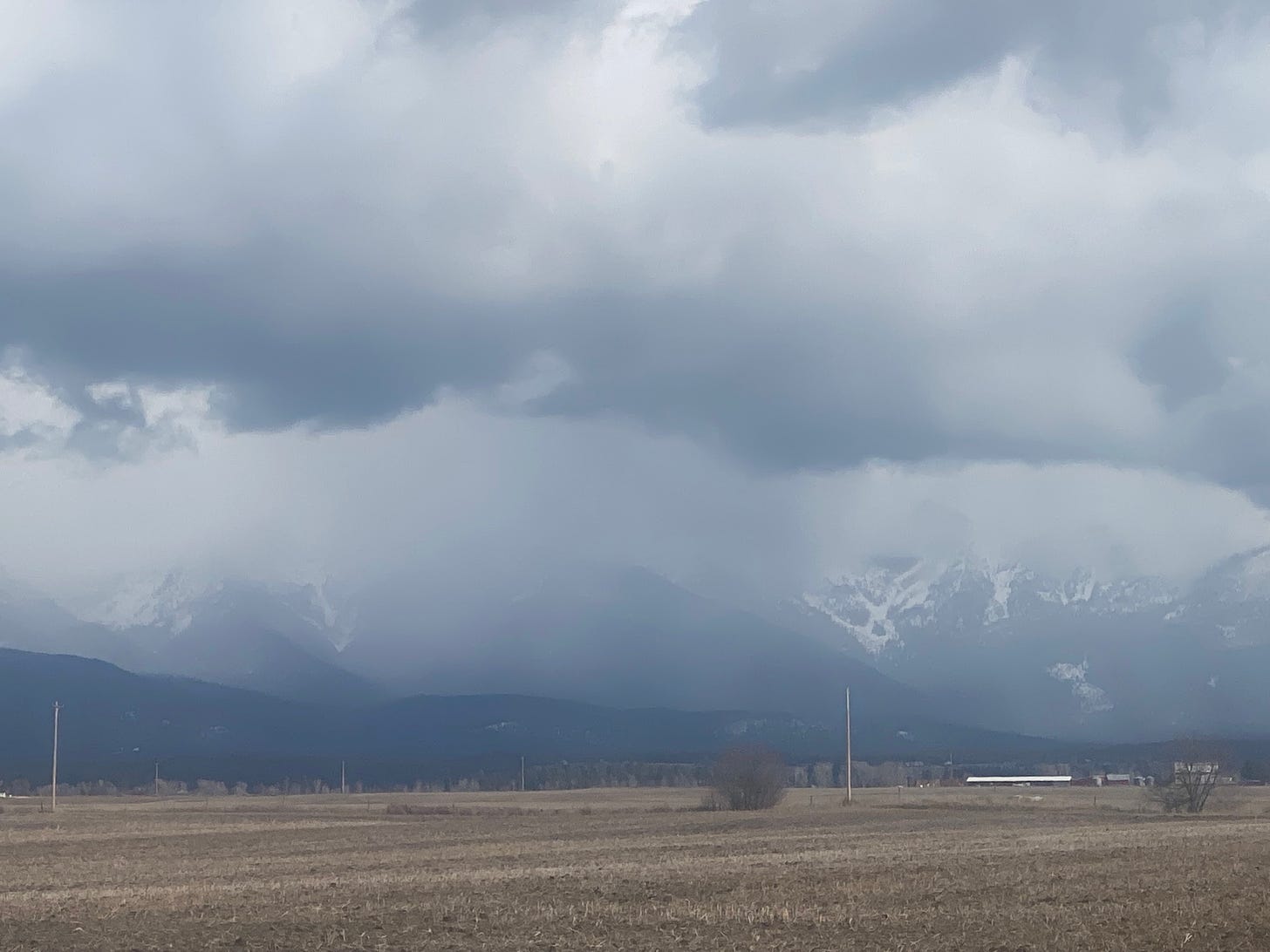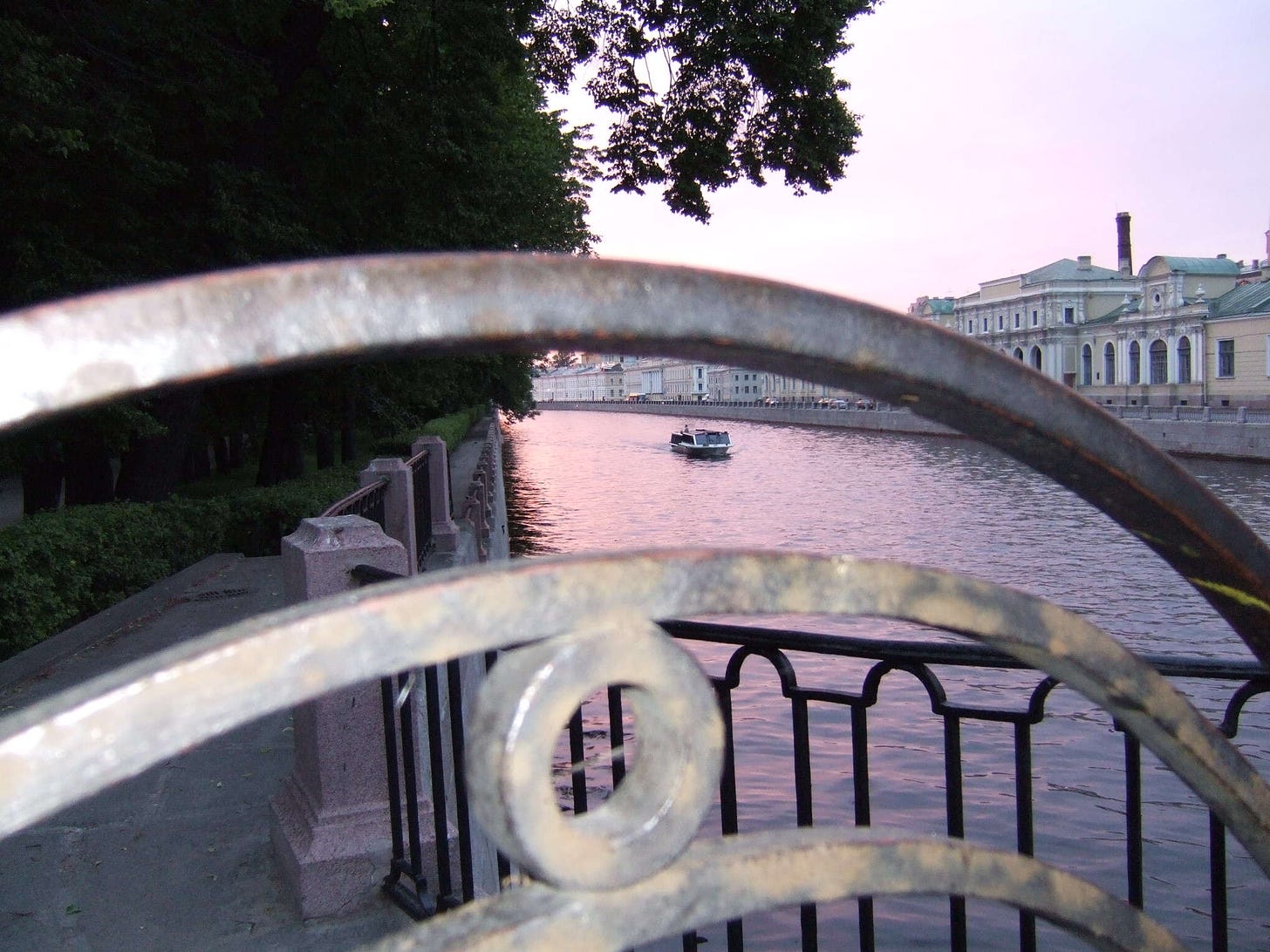“I don’t know if I can explain how fundamental this is. If someone comes to your table, you feed them, even if it means you’re a little hungrier. That’s how it works.” —Psalm for the Wild Built, Becky Chambers
My father and I talk about the goose he’s going to cook that day. Friends of theirs own a small farm outside of Moscow and gave them a goose. So they planned goose for dinner, and we talk about how to cook it, and later I think of all the stories he’s told me of his childhood under Stalin and then Khrushchev and how honest conversations and trust are channeled in repressive regimes, like the canals of St. Petersburg, beautiful but strictly bounded. Made precious by their integrity.
I’ve been reading lessons for ten- and eleven-year-olds about endangered species and animal husbandry and related vocabulary. Now, every day, the damage that extractive, domination-oriented, and commodification-driven human behavior has caused (and continues to cause) the rest of the living world is wound through with thoughts of current war and oppression. Maybe it always should be, because it always is.
The previous textbook had the students learning the word captivity.
“Say the word captivity.”
—-
My thoughts are scattered and indistinct. I talk to my father and message with my cousin, read textbooks and think all day of reading Yevgenia Belorusets’s daily diary entry, of how I can make myself present for her life right now, and all the lives she is representing. Of her risks as she chooses to stay in her beloved city. Of my own grandmother who became a refugee in the Urals with her two young children during the Siege of Leningrad, and of my grandfather who barely escaped starvation when he stayed behind.
I told a friend this week that I’m just not very good company. I’m unfairly impatient with everyone and our first-world problems, including myself. So I’ve been trying to reground. I don’t have a goose to cook, but I ordered seed potatoes and talked with the owner of the local composting service about what we might need to feed and restore the soil where last year we grew happy peas and raspberries and miserable cucumbers.
I think of the masses of worms in the garden and of the elk head I put in the back (apologies for that image) last fall, alongside the previous year’s buck head, now cleaned entirely by birds and flesh beetles. And try to remember that winter will end (too soon for me) and the thistles and knapweed will start to grow and that I must do better about showing care for this land I’ve promised to husband.
I need to consider dirt again. Which then reminds me of Ukraine’s rich farmland and how Stalin’s collectivization drive and insistence that Ukraine export all its food led to the starvation of millions.
“Use captivity in a sentence.”
—-
After talking with my father about the goose, I had to get back to work. I read a book about an Asian elephant who lost her forefoot and got a prosthetic from a free elephant hospital in Thailand. She lost her forefoot after stepping on a land mine in a former war zone where she worked as a logger. I read that, and then read it again because I had to meticulously cross-check the original text with an excerpt in the textbook, and then thought, I don’t know if I can do this anymore.
How many people in the most dire situations, now and for millennia past, have thought the same? Have seen and known cruelty beyond imagining except it’s not beyond imagining because it happened. It happens. And yet somehow we have to be among it all. Have to know of the land mines that will destroy the lives of generations of humans and elephants and wonder about how to turn all this around, and still check the grammar and think about what to make for dinner and help a kid with their math homework.
Someone left a land mine for a young elephant to step on. Someone else set up a free hospital to care for injured elephants. The world is covered with people eager to repair the harms of this world. The question is whether our capacity for caring and repairing can ever overtake our capacity to destroy and harm.
“Have the students say the word captivity.”
—-
Bonus photo: the gates of the Summer Gardens next to the Fontanka Canal in St. Petersburg, Russia somewhere near midnight in summer 2006.
Some stuff to read, listen to, or watch:
I generally assume that anyone who reads this newsletter also follows Chris La Tray’s newsletter An Irritable Métis (and if not, you should!), but just in case, this is a fantastic 4-minute documentary of him made by teens for the Big Sky Documentary Film Festival.
Russian history professor Cynthia Hooper writing in The Bulletin of Atomic Scientists about Russians’ cultural relationship with information and misinformation: “History and psychology suggest that the issue of ‘belief’ in propaganda is not straightforward, and that the majority of Russian society cannot simply be dismissed as ‘brainwashed’ by the Putin regime. Russian people do not have a record of gullibility, but rather a long tradition of irreverent humor and coded criticism of dictatorial power discernible only by ‘reading between the lines.”’
“The Voyagers,” by Bill Donahue in The Atavist is an excellently written and winding tale of a Ukrainian-born father who braved the Bering Strait crossing from Russian Siberia with his six-year-old son in 1945: what drove him out of the Soviet Union, how he escaped, and what came after.
Randy Rosenthal in The American Scholar reassesses Jack Kerouac’s influence on Buddhism and meditation in America, and how to reconcile it with his less appealing legacies and the fact that Kerouac “made up” a lot of his own Buddhism and later abandoned it for Catholicism.
Nityanand Jayaraman has been walking with a fisher elder and writing of what he learns of fisher science through their essays-in-conversation in “Science of the Seas:” “The everyday science of artisanal fishers is democratic, freely available and has its own pedagogy of embedded apprenticeship. . . . Unlike the exalted institutional sciences that produce predominantly elite and upper-caste experts, and whose expertise are accessible only to the powerful, Palayam’s expertise is subaltern, and an essential qualification for any fisher that ventures out to sea and returns home safely—with or without fish.”
“Landed,” a four-part series on the Farmerama podcast about going back to the family farm in Scotland and daring to imagine a different vision for a more just and sustainable farming future: “This indigenous land management system is agro-ecology in action and at scale. This is both a food production system and a way of life where rewilding and re-people-ing can complement one another.” (Quote is from episode 2; I can’t link to the episodes directly; scroll down past episode 67 to the series titled “Landed.”) I thought the series would be interesting but found myself quickly riveted with the many directions the host took the question that drove him: “Is the small family farm a colonial construct?” It all comes back to the commons, and of relearning how to belong to the land we live among, and from.
If I had an Anne Helen Petersen-style weekly “just trust me,” this piece from G. Travis Norvell in The Christian Century about reimagining church parking lots would be it, not for writing style or a particular story, but for the opportunity to follow along an insightful and grounded reimagining of what space is for: “What if a church parking lot functioned more like a bridge than a wall? What if it functioned like a plaza where the faith community re-neighbors itself to its once familiar home?” There is so much in here, from church parking lots being used as protected play spaces for kids or tiny home housing, to what happens to a church when it seeks only to cultivate a congregation drawn from outside its neighborhood.
And totally random but kind of incredible, an hour of French pianist Sofiane Pamart playing under the Northern Lights in Lapland, Finland. (I wish during the twenty-minute interview afterward he’d answered the question of how his fingers felt. Freezing hands are my main stumbling block when hunting, or in fact being outside in winter at all. I have no idea how he just looked so . . . chill.)





Thanks particularly for that article about church parking lots. I'm the president of a smallish congregation with quite a lot of parking. We've begun talking about the radical ways Church needs to change, and I think the parking lot might be a great addition to this conversation! This feels exciting to me.
This beautiful post was the best company, Nia. I hope you have people in your everyday life reminding you what a gift you are.